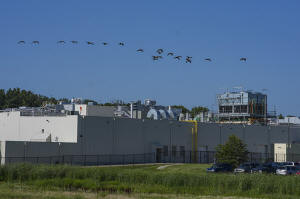Boar's Head plans to reopen troubled deli meat plant, but reports of
sanitation problems persist
[August 09, 2025]
By JONEL ALECCIA
The Boar's Head deli meat plant at the heart of last year's deadly food
poisoning outbreak is set to reopen in the coming months, company
officials said.
But recent inspections at Boar’s Head sites in three states documented
sanitation problems similar to those that led to the listeria
contamination that killed 10 people and sickened dozens.
The Jarratt, Virginia, plant was shut down in September when U.S.
Agriculture Department officials suspended operations and withdrew the
federal marks of inspection required to operate, saying the company
“failed to maintain sanitary conditions.” Boar’s Head permanently
stopped making liverwurst and recalled more than 7 million pounds of
deli products.
USDA officials this week said they had “thoroughly reviewed” the plant
and lifted the forced suspension on July 18.
“The facility is in full compliance of the guidelines and protocols set
for the safe handling and production of food and the serious issues that
led to suspension have been fully rectified,” officials with the USDA's
Food Safety and Inspection Service said in an email Wednesday.
And yet, documents obtained by The Associated Press through a freedom of
information request show that Boar’s Head plants in Arkansas, Indiana
and elsewhere in Virginia were flagged for the same kinds of sanitation
problems that led to the outbreak, with the most recent report in June.
In the past seven months, government inspectors reported problems that
include instances of meat and fat residue left on equipment and walls,
drains blocked with meat products, beaded condensation on ceilings and
floors, overflowing trash cans, and staff who didn’t wear protective
hairnets and plastic aprons — or wash their hands.

The records, which included USDA noncompliance reports logged by
inspectors from Jan. 1 through July 23, raise new questions about the
company's promises to address systemic problems and about federal
oversight of listeria contamination in plants that make ready-to-eat
foods.
“If there is evidence that food safety problems are continuing, the
government needs to make sure the company fixes them,” said Sandra Eskin,
a former USDA official who now heads STOP Foodborne Illness, a consumer
group focused on food safety.
Agriculture Secretary Brooke Rollins last month announced plans to
bolster efforts that combat foodborne germs, including listeria.
Jobs posted in Virginia
Officials at Boar's Head, the 120-year-old company based in Sarasota,
Florida, have posted job openings for two dozen positions, including a
food safety quality analyst, at the Jarratt site.
The company convened a panel of expert advisers last fall and hired a
chief food safety officer in May. The advisers include Frank Yiannas, a
former U.S. Food and Drug Administration official, and Mindy Brashears,
President Donald Trump's nominee for USDA's undersecretary for food
safety.
Boar's Head last year said they “regret and deeply apologize" for the
contamination and that “comprehensive measures are being implemented to
prevent such an incident from ever happening again.”
But company officials refused to discuss the problems found this year.
They canceled a scheduled AP interview with Natalie Dyenson, the new
food safety officer. And they declined to allow Yiannas to detail the
investigation he led into the contamination's cause.
Brashears, who now directs a food safety center at Texas Tech
University, did not respond to requests for comment about the Boar's
Head problems. An automatic email reply said the USDA nominee was
traveling out of the country until Aug. 25. She remains on the company's
food safety board.
“Boar’s Head has an unwavering commitment to food safety and quality.
That commitment is reflected in recent enhancements to our practices and
protocols" described on the company's website, Boar's Head said in an
emailed statement.
"We have also been working with the USDA in developing a plan to reopen
our Jarratt facility in a measured, deliberate way in the coming
months,” the statement said.
[to top of second column]
|

A flock of Canada Geese fly over a Boar's Head deli meat plant in
New Castle, Ind., Wednesday, Aug. 6, 2025. (AP Photo/Michael Conroy)
 Inadequate sanitation practices
The 35 pages of new inspection findings cover Boar's Head sites in
Forrest City, Arkansas; New Castle, Indiana; and Petersburg,
Virginia.
They surprised outside food safety advocates, who said that factory
conditions should have improved in the year since the outbreak was
first identified.
“You would have expected after all they went through that they would
put themselves in a place where you could essentially eat deli meat
off the factory floor,” said Brian Ronholm, director of food policy
for Consumer Reports, an advocacy group.
Rep. Rosa DeLauro called the findings “appalling.”
“This is a pattern of negligence — cutting corners to protect the
company’s bottom line at the expense of consumers and these
conditions show a complete disregard for food safety and for the
public health of the American people,” the Connecticut Democrat said
in a statement.
The findings echo the “inadequate sanitation practices” that USDA
officials said contributed to the outbreak. Key factors included
product residue, condensation and structural problems in the
buildings, a January report concluded.
At the Jarratt plant, state inspectors working in partnership with
USDA had documented mold, insects, liquid dripping from ceilings,
and meat and fat residue on walls, floors and equipment, the AP
previously reported.
While no instances of insects were documented in this year's
inspection reports, there were repeated reports of “dried fat and
protein from the previous day's production” on equipment, stairs and
walls. In April, an inspector at the Petersburg plant reported
finding discarded meat underneath equipment, including “5-6 hams, 4
large pieces of meat and a large quantity of pooling meat juice.”
Other reports detailed beaded condensation “directly over the food
contact surfaces of tables and conveyor belts.” Additional reports
documented rusting meat racks, doors that failed to close completely
and staff who ignored required handwashing stations.
The reports point to a “food safety culture problem,” said Barbara
Kowalcyk, who directs a food safety and nutrition security center at
George Washington University.
“What jumped out to me is there is an organizational culture issue
that needs to be changed,” she said. “Usually that culture has to
start at the top.”
In the meantime, she advised consumers to think carefully about deli
meat consumption. Older people and those who are pregnant or have
weakened immune systems are especially vulnerable to serious illness
from listeria infections.

“I think they need to be aware that there are issues at this
organization that still are not completely under control,
apparently,” Kowalcyk said.
Boar's Head faced multiple lawsuits from people who fell ill or from
the families of those who died. Several survivors declined to
comment publicly on the new problems, citing financial settlements
with the company that included nondisclosure agreements.
___
The Associated Press Health and Science Department receives support
from the Howard Hughes Medical Institute’s Department of Science
Education and the Robert Wood Johnson Foundation. The AP is solely
responsible for all content.
All contents © copyright 2025 Associated Press. All rights reserved |